





When it comes to affiliate and partner marketing, Admitad has long been a go-to platform for brands. Still, many users highlight recurring pain points: the dashboard can feel outdated and unintuitive, the payout processes are often delayed, and there’s a limited focus on influencer marketing compared to more specialized platforms. For these reasons, business owners and marketers are actively seeking alternatives that offer modern tools, transparent reporting, and better integrations with social commerce.
In 2025, marketers are increasingly prioritizing platforms that merge affiliate tracking, influencer discovery, and eCommerce integrations under one roof. With this in mind, we’ll take a closer look at the 10 best Admitad alternatives worth considering this year:
Let’s discover four reasons why some users might be seeking Admitad alternatives:
Publishers report balances stuck as “pending” for months, repeated support replies about “technical work on conversion,” and no clear ETA, this creates a real cash-flow and trust problem for small publishers.
Several reviewers report waiting 1 to 3+ weeks for program acceptance, or getting unexplained rejections, that delays launches, harms seasonal campaigns, and wastes ad spend.
The approval process appears inconsistent across offers, which forces teams to run parallel backup.
Users complain the platform surfaces offers that don’t match their niche, so time spent sourcing offers produces low conversion potential.
Multiple reviews call out slow response times, canned replies instead of account-level personalization, and support tickets that take too long to resolve. Several users also describe parts of the interface and navigation as confusing or unintuitive, slowing onboarding and campaign management.
Our comparison focuses on several key aspects:
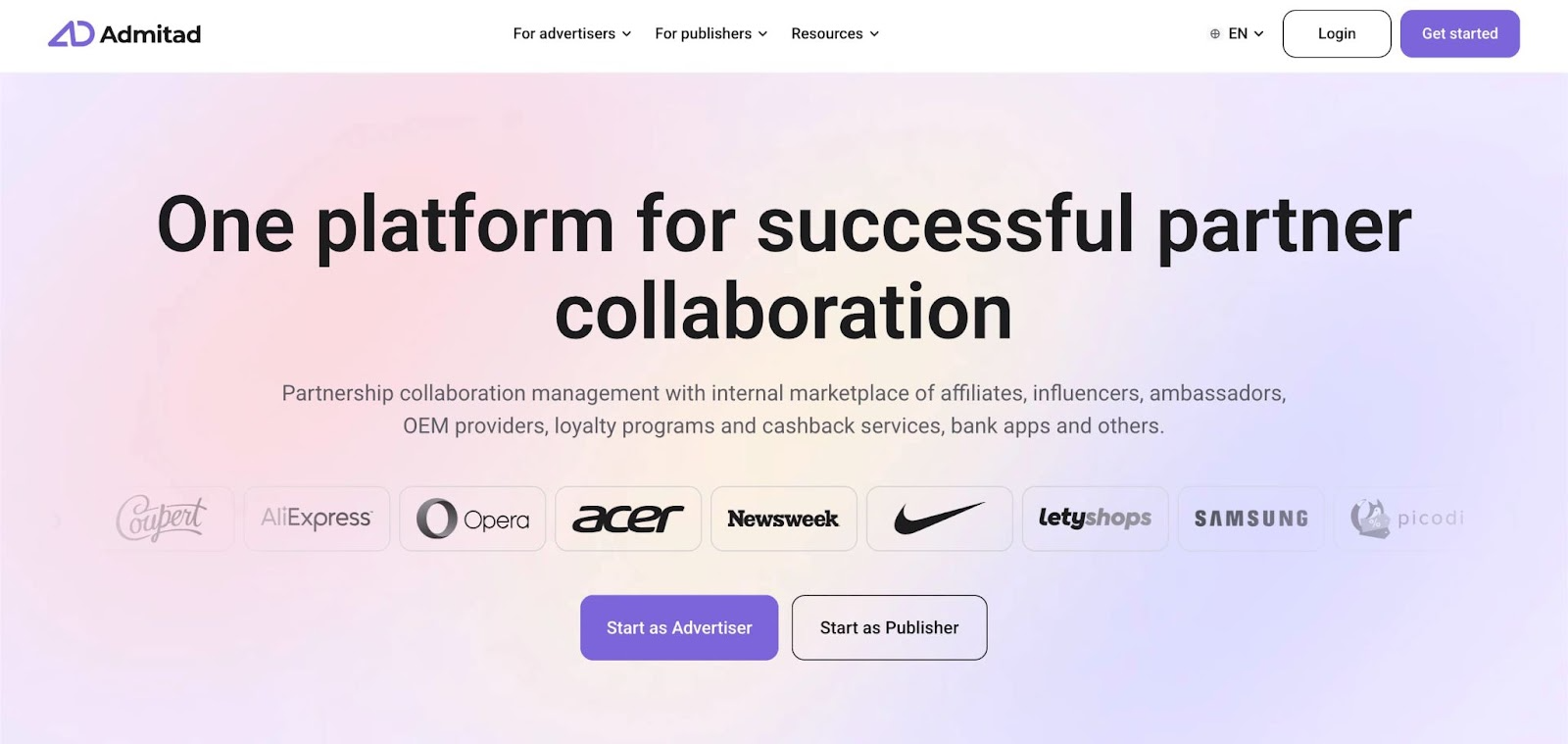
Platform Coverage: The platforms that Admitad supports includes Instagram, TikTok, YouTube, Telegram.
Best For: e-commerce, mobile app, travel, finance and global brands (or those expanding into multiple geographies) that want to scale both affiliate and influencer/creator campaigns, combining performance marketing (sales / installs / leads) and content / brand exposure.
Pricing: Commission-based pricing and depends on the advertiser's needs, the specific traffic types, and the volume of sales generated.
Reviews: 4.8 / 5.0 (G2)
Ease of Use (UX/UI): Many users say the dashboard is fairly intuitive, especially for managing affiliate programs. However, there are reports that some parts of the interface feel confusing; for example, filtering for offers or managing geo / country settings can be less obvious. New users sometimes require more support to understand tracking methods.
Customer Support: Many users praise the support for being helpful. On the flip side, some users complain about delays in responses, especially for payout or account issues, or when trying to escalate problems; there are complaints about generic responses or lack of clarity on refund / anti-fraud decisions.

Platform Coverage: Instagram, TikTok, YouTube, Facebook, Pinterest, Snapchat, X, Twitch
Best For: Influencer Hero is best for growing D2C brands and eCommerce teams looking for an all-in-one solution to scale influencer campaigns with measurable ROI. It’s especially suited for brands that want to combine influencer discovery, automated outreach, CRM, reporting, and affiliate management in a single platform.
Pricing: (Plans are monthly and scalable.)
Reviews: 5.0 / 5.0 (Capterra)
Ease of Use (UX/UI): With an easy-to-navigate dashboard, drag-and-drop campaign setup, and customizable email templates, teams can launch campaigns quickly without a steep learning curve. Automated workflows and a Chrome extension further reduce manual work, saving hours each week.
Customer Support: The platform delivers 24/7 real-human live chat, responsive email assistance, and an extensive Help Center filled with video and written tutorials. Every plan includes a dedicated account manager from day one, with optional strategy consultations for growth guidance. Pro plan users also gain access to a private Slack channel.
While Admitad primarily operates as a global affiliate and performance marketing network, connecting brands with publishers and offering commission-based campaigns, Influencer Hero is a dedicated influencer marketing platform designed for eCommerce and D2C brands that want end-to-end campaign management. Admitad emphasizes performance channels like coupons, cashback, and product feeds, whereas Influencer Hero specializes in influencer discovery, AI-powered outreach, CRM, and content/UGC collection.
Pricing is another key distinction: Admitad does not disclose clear pricing publicly, instead relying on commissions and platform fees that may vary by partner and region. In contrast, Influencer Hero offers transparent pricing tiers starting at $649/month with clear contact limits.
This makes Influencer Hero easier to evaluate and scale, especially for brands seeking predictable costs and direct influencer relationships, rather than relying on third-party publisher networks.
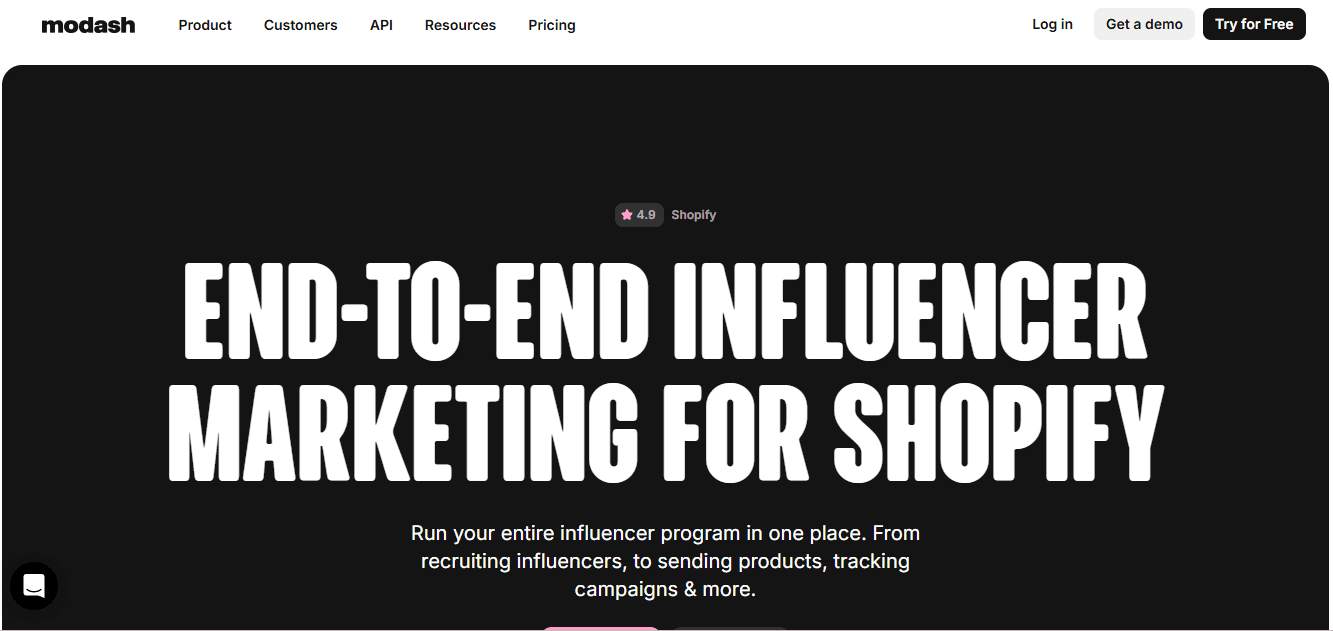
Platform Coverage: Instagram, TikTok, YouTube, and profile recognition for X, Snapchat, and other platforms.
Best For: eCommerce and D2C brands, especially Shopify users, who want to run influencer campaigns at scale with strong discovery tools, automated outreach, affiliate tracking, and direct gifting integrations.
Pricing: Modash offers free trials to both their Essentials and Performance plan.
Reviews: 4.9 / 5.0(Capterra.com)
Ease of Use (UX/UI): Users find Modash’s interface clean and streamlined, designed for speed and efficiency. The discovery filters and outreach workflow are intuitive, reducing manual steps and making campaign setup fast.
Customer Support: Modash is praised for responsive onboarding and reliable customer support. Users note the team is quick to assist with setup and troubleshooting, ensuring campaigns run smoothly.
Admitad and Modash approach influencer and affiliate marketing from different angles. Admitad operates as a global affiliate and performance marketing network, connecting brands with publishers like coupon and cashback sites, content creators, and affiliates. Its strength lies in its wide publisher base, fraud prevention tools, and multi-market coverage. However, Admitad’s pricing structure is commission-based and not fully transparent, with additional platform fees that vary by campaign.
By contrast, Modash is purpose-built for influencer marketing, with a massive creator database and advanced discovery features. It focuses on transparency with clear annual subscription pricing starting at $199/month, making costs predictable. Modash also integrates directly with Shopify, streamlining gifting, affiliate tracking, and payouts, a clear advantage for D2C eCommerce brands.
Brands choosing between the two should consider priorities: Admitad is better for global affiliate reach and performance marketing, while Modash is the stronger choice for influencer-focused campaigns with direct creator relationships and end-to-end campaign management.

Platform Coverage: Instagram, TikTok, YouTube, X , Twitch, Pinterest, WordPress blogs.
Best For: Medium-to-large eCommerce or D2C brands and agencies that want a full-stack influencer & affiliate marketing solution, with strong discovery tools, content/UGC management, robust analytics, and integrations with eCommerce, payments, and other marketing tools.
Pricing: Upfluence offers annual contracts with the following pricing.
Reviews: 4.6 / 5.0 (G2)
Ease of Use (UX/UI): Users generally find Upfluence’s interface to be quite powerful, with rich filtering, search, and reporting dashboards. However, some reviews note that because there are many features, there can be a steep learning curve and that onboarding takes time.
Customer Support: Upfluence’s customer support is frequently praised: onboarding sessions are common, reps are responsive, and there are training / live Q&A resources. On the flip side, some users have complained about hidden clauses in contracts (renewals), or that support changes personnel often, which can disrupt continuity.
Admitad is more focused on the affiliate side and often works on commission / revenue share models, while Upfluence offers a full influencer and affiliate combo with strong tools for content, creator management, UGC, and deeper analytics.
Price is one of the key differentiators:
Upfluence tends to require higher monthly spend plus an annual commitment and is modular, so costs climb when you enable more features.
Admitad, depending on the use case, may have lower upfront cost or different fee structures, especially for easier affiliate models. Because of that, for brands primarily interested in affiliate performance and publisher networks, Admitad might be more cost-efficient; whereas for brands wanting tight creative control, content oversight, influencer relationship, and integrated UGC, Upfluence is likely the more powerful investment.
Brands should choose Upfluence if they are serious about end-to-end influencer marketing, have the budget, and want advanced data/automation. Choose Admitad if focusing more narrowly on affiliate/performance with publisher networks, potentially lower cost, and less need for creative or UGC content features.
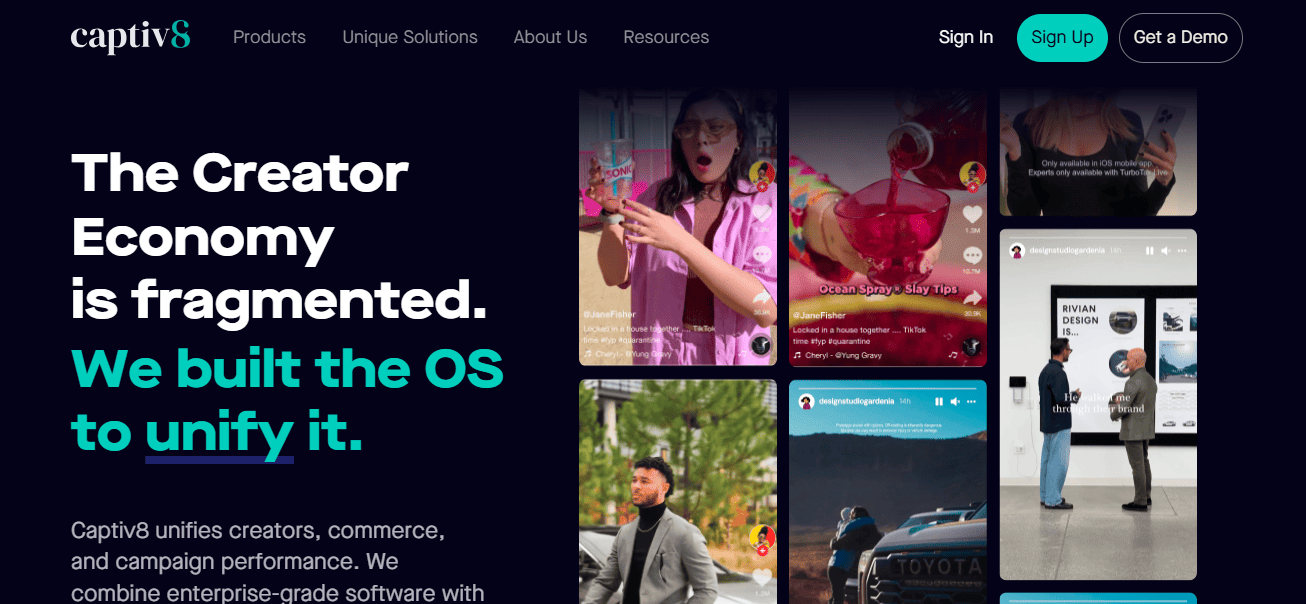
Platform Coverage: Captiv8 supports influencer campaigns across Instagram, YouTube, TikTok, Facebook, Twitter, and Pinterest.
Best For: Enterprise brands and agencies that need large-scale influencer marketing campaigns with advanced data analytics, competitor tracking, and deep campaign measurement. It’s particularly suited for organizations with bigger budgets that want robust reporting, competitive intelligence, and integrated commerce features.
Pricing:
No monthly or customizable plans are available; pricing is rigid and enterprise-focused
Reviews: 4.6 / 5.0 (G2)
Ease of Use (UX/UI): Users highlight that Captiv8 offers powerful search filters and customizable reporting dashboards, making it highly functional once set up. However, due to its enterprise focus, the platform can feel complex for smaller teams and requires training to fully leverage.
Customer Support: Customer feedback is mixed. While some enterprise clients report helpful onboarding, many users and creators have raised concerns about slow or unresponsive customer service and payment-related issues, affecting both brands and influencers.
Discover our roundup of the top 10 Captiv8 alternatives and explore platforms that offer better pricing, stronger automation, and real ROI.
Admitad and Captiv8 serve different segments of the marketing landscape.
Admitad focuses on performance-driven affiliate marketing, offering brands access to a broad global publisher network of coupon sites, cashback platforms, and affiliates. Its pricing model is commission-based, with advertisers paying only for results, making it more accessible to brands with tighter budgets or those focused on measurable conversions.
By contrast, Captiv8 is built for large-scale influencer marketing and brand campaigns, offering advanced search, sentiment analysis, competitor tracking, and deep reporting features. However, its pricing starts at $25,000 annually, making it primarily suited for enterprise-level organizations.
Brands should choose Admitad if they want cost-flexible, performance-based campaigns through an extensive affiliate network. Captiv8, on the other hand, is a better fit for large enterprises prioritizing data-rich influencer campaigns, competitive insights, and advanced reporting, even if that comes with a significantly higher cost.
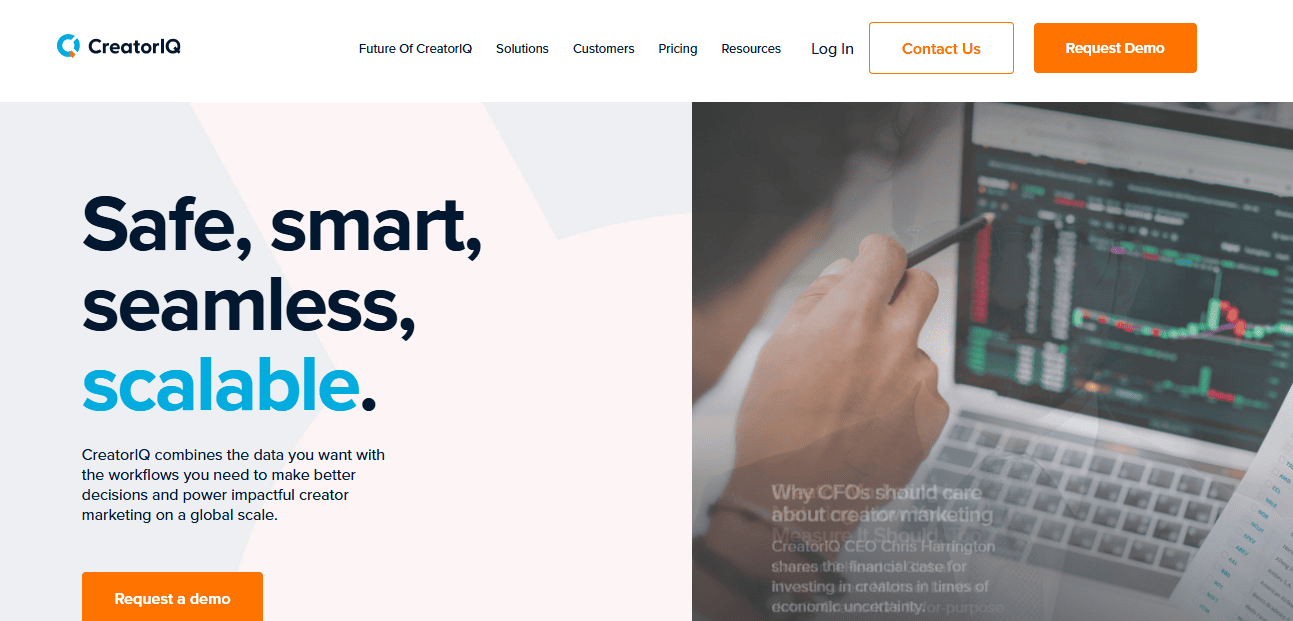
Platform Coverage: Instagram, TikTok, YouTube, Facebook, Pinterest, Twitch, X.
Best For: Enterprise brands and global organizations that require a highly scalable, end-to-end influencer marketing solution. With deep integrations, advanced analytics, and built-in compliance and payments, it’s particularly suited for companies running large influencer programs across multiple regions and platforms.
Reviews: 4.6 / 5.0 (G2)
Ease of Use (UX/UI): Users describe CreatorIQ as feature-rich and professional, offering granular search and highly customizable dashboards. However, due to its complexity and enterprise-level scope, new users may face a learning curve during onboarding.
Customer Support: Customer support is consistently praised, with dedicated implementation managers and success teams that provide onboarding, quarterly planning, and ongoing campaign support.
Admitad is primarily a performance and affiliate marketing network, connecting brands with publishers and affiliates like coupon and cashback sites. Its commission-based model makes it cost-efficient for companies focused on direct sales and lead generation.
CreatorIQ, on the other hand, is a full-scale influencer marketing platform trusted by enterprise clients like Disney and Lululemon. It provides end-to-end lifecycle management, from influencer discovery and campaign execution to payments and advanced analytics. Pricing starts at $35,000 per year, making it significantly more expensive but also more robust.
For brands deciding between the two, Admitad is a better choice if the goal is performance-driven affiliate reach with lower upfront investment. CreatorIQ is better suited for enterprises needing advanced influencer relationship management, global compliance, and deep data integrations to run high-scale campaigns across multiple markets.
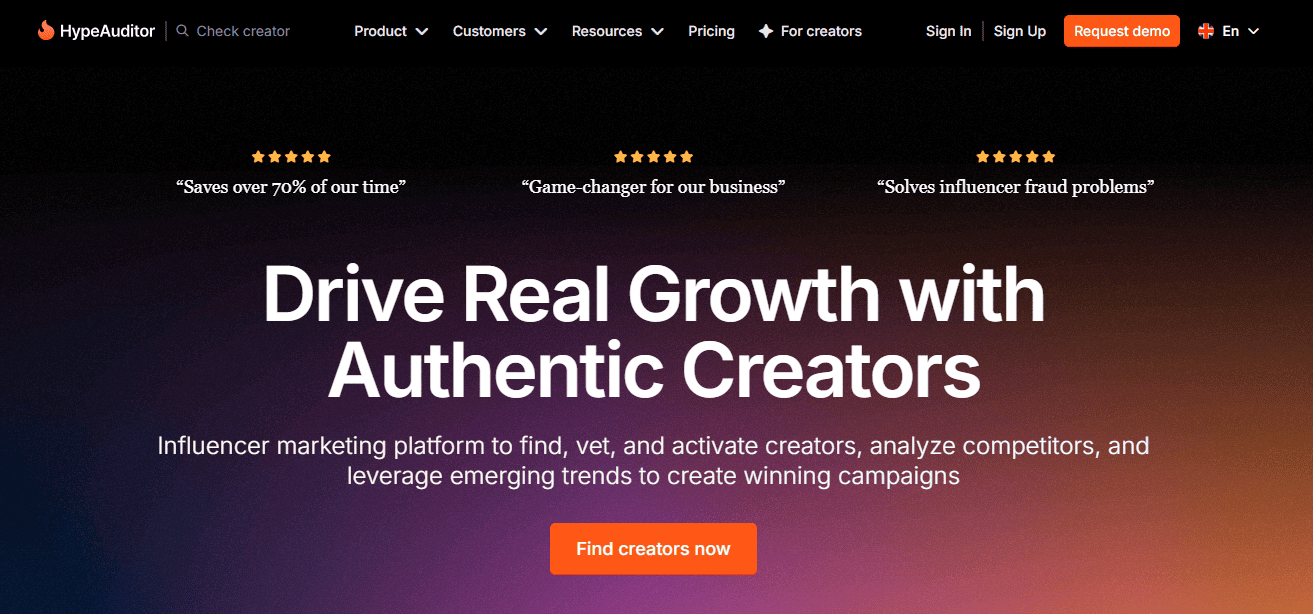
Platform Coverage: Instagram, TikTok, YouTube, Twitch, X (Twitter), Snapchat
Best For: Brands, agencies, and eCommerce teams that need advanced influencer analytics and fraud detection to ensure campaign authenticity. It’s particularly strong for companies that value AI-powered discovery, audience quality analysis, and detailed campaign ROI tracking across multiple platforms.
Pricing: Custom plans based on usage. Flexible contract terms depending on platform access, campaign volume, and number of reports.
Reviews: 4.5 / 5.0 (G2)
Ease of Use (UX/UI): Users highlight that HypeAuditor’s dashboard is intuitive and visually clear, making it easy to analyze influencer data and reports. However, due to the depth of analytics and customization options, some beginners may find the platform complex at first without training.
Customer Support: Customer support is generally regarded as responsive and knowledgeable, with onboarding included in most plans. Some users note that the learning curve requires active support engagement to get the most out of advanced features.
Admitad is a global affiliate and performance marketing network focused on connecting brands with publishers and affiliates. Its commission-based structure makes it cost-effective for brands that prioritize performance-driven sales and affiliate partnerships.
By contrast, HypeAuditor is an influencer marketing intelligence platform centered on analytics, fraud detection, and campaign tracking. Instead of connecting brands with publishers, it equips marketing teams with the tools to evaluate influencers’ authenticity, audience demographics, and ROI.
Pricing starts at around $10,000/year, making it more of an investment for data-focused teams, while Admitad may be less expensive upfront but less specialized in influencer insights.
Brands should choose Admitad if they want scalable affiliate reach with predictable commission-based costs. HypeAuditor is the stronger option for brands and agencies seeking trustworthy influencer analytics, fraud prevention, and ROI validation before investing in influencer partnerships.
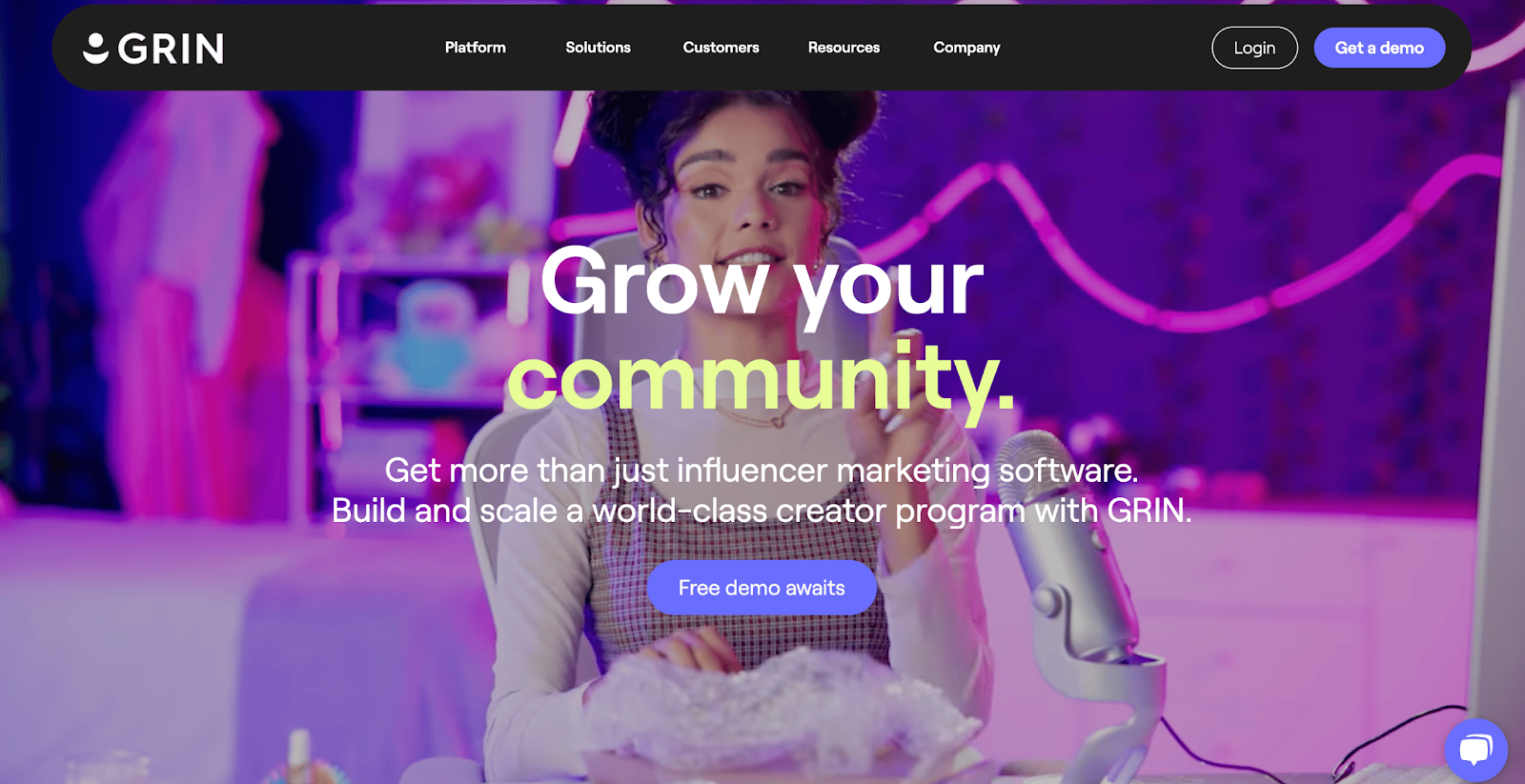
Platform Coverage: Instagram, TikTok, YouTube, X, Twitch, Snapchat
Best For: DTC and eCommerce brands that want an end-to-end influencer marketing platform with deep eCommerce integrations. It’s particularly suited for brands on Shopify, WooCommerce, Magento, or BigCommerce looking to automate product seeding, gifting, payments, and UGC collection while tracking ROI in real time.
Pricing: Plans start at $25,000 per year, with monthly payments available and a required 12-month commitment; typical monthly costs range from $2,500 to over $10,000 depending on usage, though pricing transparency may vary based on selected features.
Reviews: 4.5 / 5.0 (G2)
Ease of Use (UX/UI): Users say GRIN provides a centralized, all-in-one dashboard that reduces the need for spreadsheets and external tools. However, some reviews mention bugs and occasional performance issues that affect the overall user experience.
Customer Support: Customer support is generally considered helpful during onboarding and setup, with optional strategic services available. Still, some users report delays in resolving issues and inconsistent follow-up, especially with billing or technical bugs.
Discover our breakdown of 10 standout GRIN alternatives, highlighting features, affordability, and user experience, to optimize your influencer marketing strategy.
Admitad is a performance marketing network, connecting brands to affiliates like coupon sites, cashback platforms, and publishers. It operates on a commission-based model, making it cost-efficient for brands that want broad affiliate reach and measurable performance without large upfront costs.
GRIN, by contrast, is a full influencer relationship management (IRM) platform designed for eCommerce and DTC brands. Its strength lies in deep eCommerce integrations, influencer CRM, gifting automation, and UGC management. With pricing starting around $25,000/year, GRIN requires a higher upfront investment but delivers end-to-end control over influencer programs and ROI tracking.
Brands should choose Admitad if their goal is cost-flexible affiliate performance campaigns through a global publisher network. On the other hand, GRIN is the stronger choice for eCommerce-focused brands that want to directly manage influencers, automate workflows, and track ROI seamlessly from gifting to conversions.
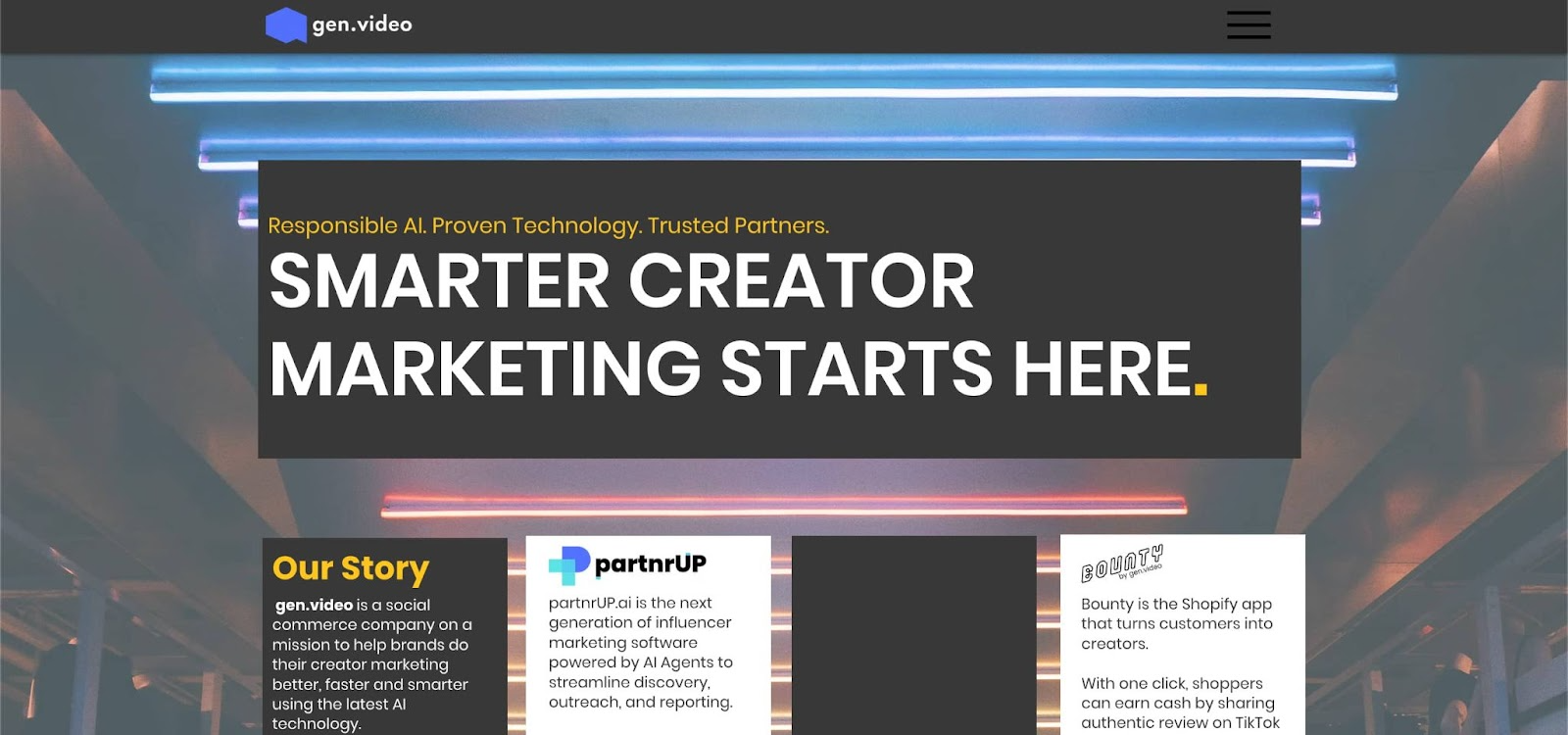
Platform Coverage: Instagram, TikTok, YouTube.
Best For: Mid-to-large eCommerce brands and agencies that want to connect influencer marketing directly to retail sales. The platform specializes in video commerce and shoppable content, with seamless integrations into Amazon, Walmart, and Target.
Pricing: Pricing details are not publicly available. The platform typically operates on custom enterprise agreements tailored to campaign scope, features, and retail partnerships.
Reviews: 4.7 / 5.0 (G2)
Ease of Use (UX/UI): Gen.video’s platform is more complex than standard influencer tools, with an average onboarding period of around three months. While the learning curve is steeper, the dashboard provides robust analytics and retail-focused insights once mastered.
Customer Support: The platform offers dedicated account managers who provide personalized guidance on campaign strategy and execution. Clients consistently highlight responsive and attentive support as one of its strongest aspects.
Admitad is a global affiliate and performance marketing network, enabling brands to scale through publishers, cashback, and coupon partners on a commission-based model. This makes it cost-effective for companies that prioritize measurable performance without high upfront investment.
By contrast, gen.video is built specifically for retail-focused eCommerce brands. Its strength lies in connecting influencer video content directly to sales on platforms like Amazon, Walmart, and Target. While pricing is enterprise-only and less transparent, it offers advanced analytics and attribution that are highly valuable for brands prioritizing retail ROI.
Choose Admitad for broad affiliate reach and flexible performance-based costs. Opt for gen.video if your brand is mid-to-large scale and retail-focused, and you want to leverage video commerce with deep retailer integrations.
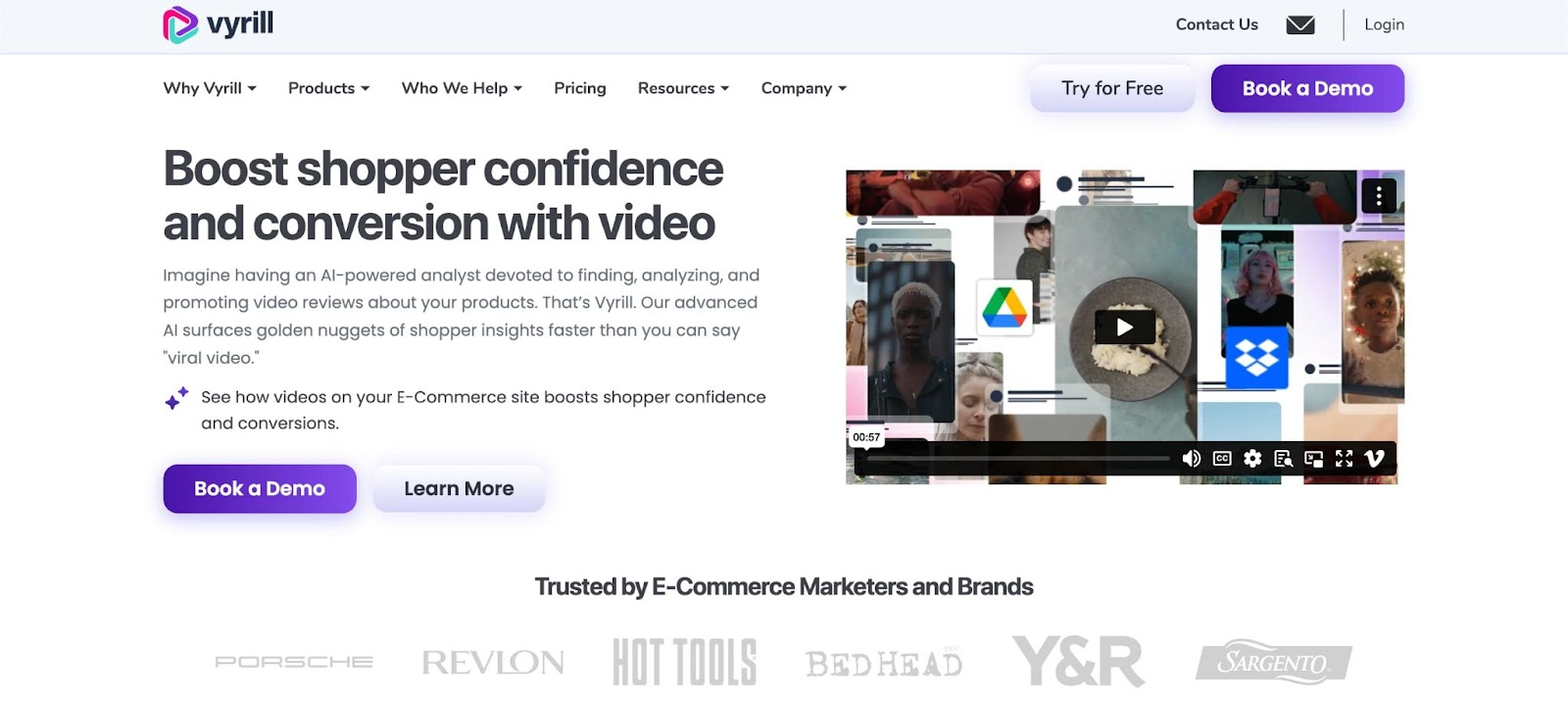
Platform Coverage: YouTube, Instagram, TikTok.
Best For: D2C brands and online retailers pursuing video-first strategies. It’s especially valuable for Shopify stores and eCommerce teams that want to embed customer video content directly on product pages.
Pricing: Vyrill provides tiered plans tailored to different business needs:
Reviews: 5.0 / 5.0 (Shopify App Store)
Ease of Use (UX/UI): Vyrill integrates smoothly with Shopify and other eCommerce platforms. While its AI-powered in-video search is a standout, some users note a learning curve with advanced filters before workflows become seamless.
Customer Support: Email and live chat support are available on Starter and Growth plans, while Enterprise clients receive personalized onboarding and phone support. Enterprise users highlight particularly fast and attentive service.
Admitad and Vyrill cater to very different brand objectives.
Admitad connects brands with a large affiliate and publisher network, making it well-suited for performance-based sales campaigns with global reach. Its commission-based model helps brands manage costs by paying only for results.
Vyrill, meanwhile, is highly specialized in video commerce and UGC. It equips brands with AI-powered video intelligence and tools to embed shoppable video experiences directly onto eCommerce product pages. While pricing begins at $249/month, it scales higher for advanced analytics and enterprise needs.
For brands prioritizing broad affiliate reach and commission-driven growth, Admitad is the better choice. For companies wanting to harness video content, customer reviews, and fan-created media to drive conversions on eCommerce sites, Vyrill is the stronger fit.

Platform Coverage: Built exclusively for Shopify stores, with integrations to Shopify Plus, Google Shopping, Meta Shops, Klaviyo, and Omnisend.
Best For: Shopify merchants and DTC brands that want to boost conversions with authentic, visual product reviews. It’s particularly effective for stores looking to leverage customer UGC (photos and videos) while driving word-of-mouth referrals and repeat purchases.
Pricing:
Beginner plan offers a 7-day free trial, while Scale and Unlimited both offer a 14-day free trial.
Reviews: 4.9 / 5.0 (Shopify App Store)
Ease of Use (UX/UI): Users find Loox to be intuitive and easy to set up, with most stores able to launch review widgets in minutes. The no-code, mobile-optimized widgets make customization seamless, even for non-technical users.
Customer Support: Loox is praised for its responsive 24/7 support team, with quick answers via email. Many Shopify users note that the team provides clear instructions and assistance, even before subscribing, though some report slower response during peak periods.
Admitad and Loox operate in very different areas of the marketing stack. Admitad is a performance and affiliate marketing network, helping brands reach new customers through publishers, cashback, and coupon sites. Its commission-based pricing makes it attractive for companies aiming to scale affiliate campaigns globally with minimal upfront investment.
Loox, by contrast, is not an affiliate network but a UGC and review marketing app built exclusively for Shopify. Instead of connecting brands with affiliates, Loox helps merchants leverage their existing customers by collecting reviews, showcasing them on-site, and encouraging referrals. Pricing starts as low as $12.99/month, making it far more affordable and flexible than Admitad’s commission-based costs.
Brands should choose Admitad if they want to expand through affiliate networks and global publishers. Loox is the stronger choice for Shopify merchants that want to grow conversion rates and sales by building trust through authentic UGC and customer referrals.
When evaluating alternatives to Admitad, it becomes clear that many brands are moving toward platforms that provide more transparency, stronger influencer marketing capabilities, and seamless eCommerce integrations.
While Admitad is a solid option for performance-based affiliate campaigns, its shortcomings make it less appealing for brands that prioritize speed, authenticity, and direct creator partnerships. Among capable solutions, Influencer Hero stands out as one of the best Admitad alternatives, offering a true all-in-one solution for influencer discovery, outreach, CRM, UGC collection, affiliate tracking, and storefront management. With transparent pricing, multi-platform coverage, and exceptional customer support, it gives brands a streamlined way to scale campaigns while maintaining measurable ROI.
For D2C and eCommerce companies looking to combine influencer and affiliate marketing in a single platform, Influencer Hero delivers the flexibility and growth potential that Admitad and other legacy networks often lack.
Book a demo with Influencer Hero today to see how it can simplify and scale your influencer and affiliate campaigns today!

Admitad has issues like payout delays, confusing dashboards, and slow support. Alternatives such as Influencer Hero, Modash, or Upfluence offer faster workflows, better reporting, and stronger influencer tools.
Influencer Hero is the top choice. It combines influencer discovery, outreach, CRM, UGC tracking, and affiliate management — unlike Admitad, which relies mainly on publisher networks.
Admitad uses commission-based fees that lack transparency. Platforms like Influencer Hero (from $649/month) or Modash ($199/month annual) offer clear subscriptions, while enterprise tools like CreatorIQ or Captiv8 cost $25K–$200K/year.
Influencer Hero and Modash are best. Influencer Hero covers both affiliates and influencers, while Modash is strong for discovery and Shopify integration.
Yes. Influencer Hero is built for both in one dashboard. Upfluence and GRIN also combine the two, but at higher costs.



Schedule a Demo with one of our media experts below.